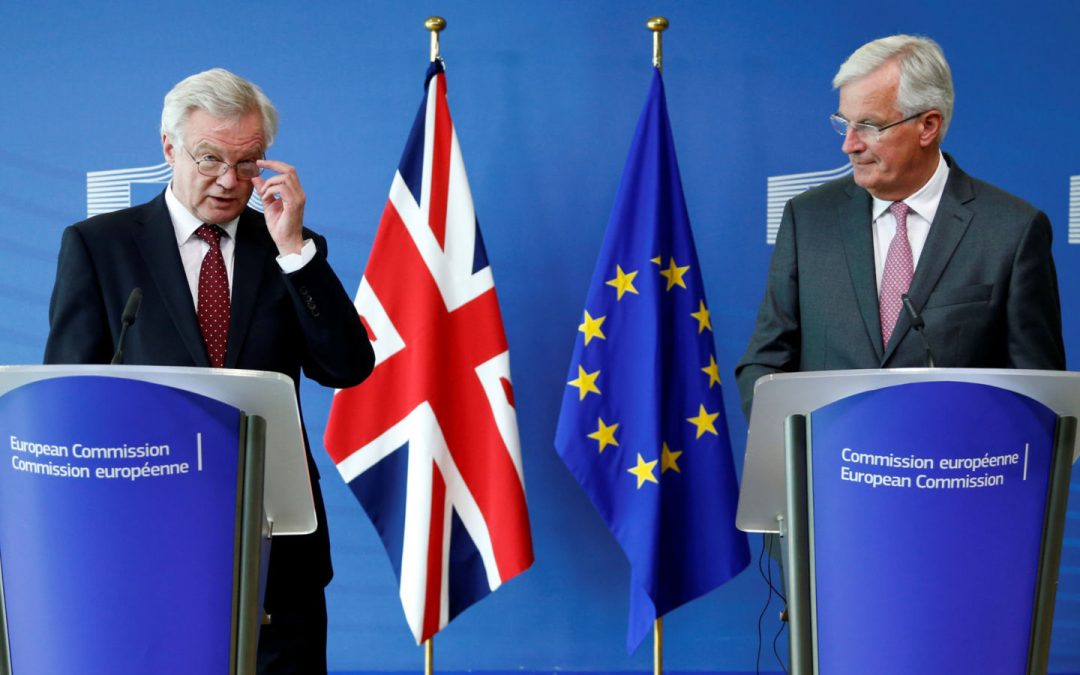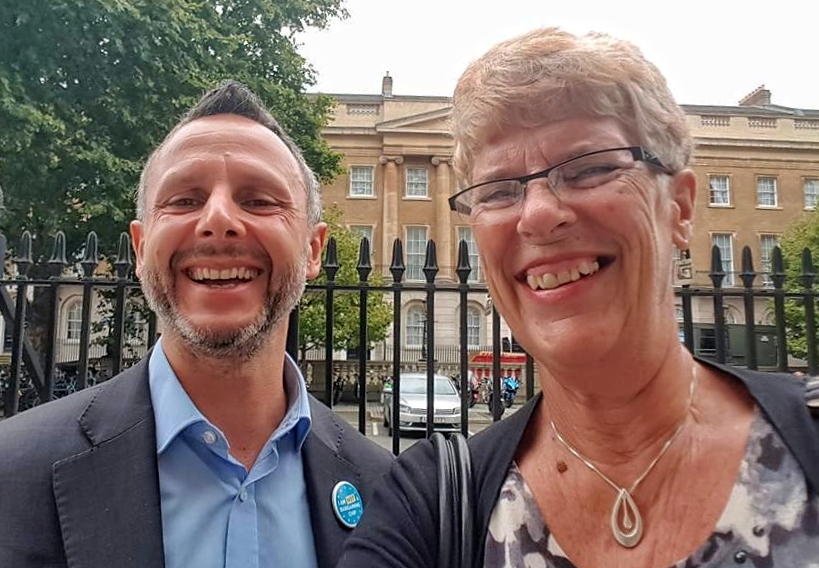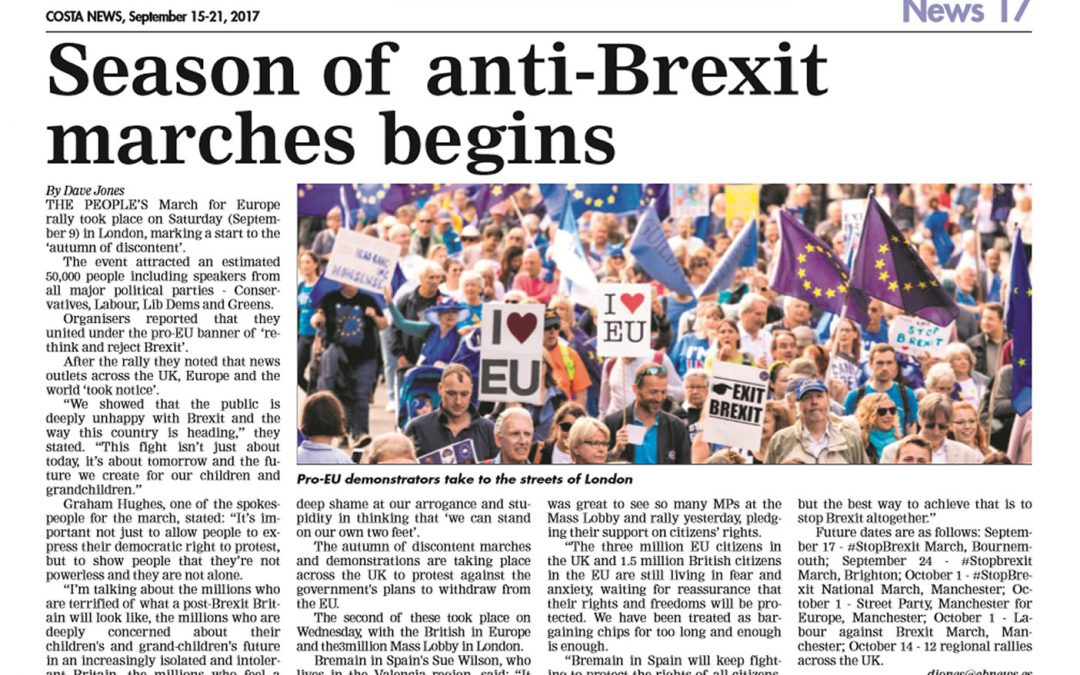
Response of British in Europe and the3million to the 4th round of negotiations
Response of the3million and British in Europe to Round 4 of the Negotiations
Executive Summary
- the3million and British in Europe note that some progress has been made in this round over matters such as direct effect, frontier workers, and finalising the agreement on healthcare.
- Nevertheless, our overall assessment at this stage in the negotiations is that the rights that we currently have as EU citizens are not being protected. The principle expressed by M. Barnier that “Brexit should not alter the nature of people’s daily lives” is being undermined with each round of the negotiations. The fact that boxes in the technical note turn green does not mean that our rights are being defended.
- All the fundamental concerns expressed earlier remain including, in particular, as regards the UK’s proposal of settled status, and the EU’s position not to grant free movement rights to UK citizens in the EU.
- Above all, the declared fundamental status of EU citizenship is being seriously tested in this unprecedented situation, – and, unfortunately, to date it has been found wanting. Which leaves around 5 million EU citizens asking the question, if not now, when?
Introduction
British in Europe and the3million as always welcome the de-briefing and consultation which has taken place with us following this fourth round of the negotiations.
There appears to have been more progress during this round than during the last. Nevertheless, it appears unlikely that Michel Barnier will recommend to the EU Council that sufficient progress has been made for the talks to be able to proceed to the next stage or that the possibility of no deal is ruled out. This makes it all the more important for the parties to consider the ring-fencing of an agreement on citizens’ rights.
Moreover, it also appears at this point in the negotiations that any progress that has been made does not extend to the fundamentals, and that it is not in fact the intention of the parties to confirm the complex bundle of interlinked rights that we currently have as EU citizens. More boxes in the technical note turning green simply means that the parties have found a compromise; it does not mean that our rights are being defended.
In this response, we will take a different approach to our responses to Rounds 2 and 3. While we will look at the issues which we are told have arisen during the latest round of negotiations, we will also go back to some of the essential principles that we have raised in our previous responses and position papers, including the initial premises on which we argued that these negotiations should be approached. Finally, the fact that we do not specifically refer to issues raised in previous rounds should not be taken as suggesting that these concerns no longer apply.
Overview
the3million and British in Europe argued at the outset of these negotiations that the UK’s withdrawal from the EU should not have a retrospective and adverse effect on individuals. UK citizens currently resident in the EU and EU citizens currently resident in the UK should be expressly treated as continuing to have the same rights as they had acquired or were in the process of acquiring before Brexit. We explained that simply confirming a right of residence is not enough, as the EU citizenship rights that these citizens currently have are indivisible and they need the full complex of rights in order to live, work and continue their lives in the country where they currently reside. And this is a matter of fundamental justice, because these citizens, EU citizens in the UK and UK citizens in the EU, moved in good faith to another EU country, relying on their EU citizenship rights, in particular, their right of to move and reside freely across the territory of the Member States.
Our overriding impression is that, as the parties negotiate on the issue of citizens’ rights, with each side claiming to be concerned to protect the rights of affected citizens, all of this has been forgotten. In particular, it has been forgotten that the compromises that the parties make will have life- changing repercussions for the lives of real people. We remind the parties that this part of the negotiation is about the rights enjoyed by individual UK citizens in the EU and individual EU citizens in the UK at Brexit. There is no doubt that the principle expressed by M. Barnier that “Brexit should not alter the nature of people’s daily lives” is being undermined. Currently, neither the position of the UK nor that of the EU would guarantee the status quo for these citizens.
Ultimately, these issues concerning citizens’ rights go back to the fundamental nature of EU citizenship, which is confirmed, inter alia, in Directive 38/2004, the secondary legislation that implements the primary EU Treaty right to move and reside freely across the territory of the Member States, in its third preamble:
“Union citizenship should be the fundamental status of nationals of the Member States when they exercise their right of free movement and residence.”
This principle is also confirmed in the case law of the Court of Justice of the EU (CJEU), for example, Case C-135/08 Rottmann and Case C-184/99 Grzelczyk. Not only this, but settled case law of the CJEU has held that EU citizens should not be penalised for having exercised their rights of free movement.
These fundamental principles concerning EU citizenship and free movement are directly relevant to the rights of the citizens affected by Brexit. The EU created EU citizenship and encouraged millions of Europeans to use their EU citizenship rights to build lives in other Member States. The 4.5-5 million citizens now caught up in the transitional problems created by Brexit have done so. If the fundamental status of EU citizenship means anything, it should surely protect the rights of these EU citizens, even in this situation where a Member State has decided to leave the EU. This is the first serious test of the fundamental status of EU citizenship – and it has to date been found wanting.
The Article 50 negotiations are international negotiations under international law and there is nothing in Article 50 or in the concept of EU citizenship that would prevent the current rights that these citizens have as EU citizens from being confirmed and guaranteed in the Withdrawal Agreement. We note that Article 21 has been included as regards personal scope and family members in the technical note and we welcome the reference to this primary Treaty right in the table. But the EU needs to go further. Indeed, the idea that inalienable EU citizenship rights could simply be removed retrospectively from around 5 million citizens cannot be legally justifiable and will surely leave both sides in the negotiations open to potential legal action.
Settled Status vs Discretion of EU law
We are very concerned that while the comparative table suggests that the UK is moving away from the language of ‘settled status’, there is little to believe that this actually implies that the rights of EU citizens in the UK will be respected. We would like to make clear to the EU Institutions that the mere colouring of green boxes does not imply that the EU is doing all possible to protect its citizens in the UK. Behind the apparent convergence of the UK and EU position lies the hard truth that EU citizens in the UK are left to a great extent in the discretionary hands of the UK Government, and the last round of negotiations seems even to have strengthened this risk. We have already stressed the appalling consequences facing EU citizens should they be forced to comply with the settled status proposal. It is disappointing that the EU is not prepared to dismiss the concept entirely in favour of a more realistic and fair alternative. While the WA will use concepts of EU law, it is not guaranteed that the transposition at UK level will not revert to concepts of immigration law. At the same time, the EU’s alternative to settled status is based on a formalistic acceptance of the discretion normally allowed to Member States under EU law. However, in an appendix to this paper, we will make clear that such an approach has dramatic consequences when applied to a country that will no longer be part of the EU and given the way the UK has implemented free movement rules so far. We therefore ask the EU to abandon its formalistic reliance on the discretion allowed by EU law and instead do justice to its citizens by reflecting on the appropriate legal mechanisms available to ensure the rights and lives of its citizens in the UK are not put into jeopardy.
Free movement
We acknowledge that the overall EU position takes as its starting point the confirmation of the rights that citizens have in their countries of residence, at least as regards their rights of residence. Thus the EU’s position on permanent residence and acquiring that status, unlike that of the UK, is declaratory and confirmatory of current rights, rather than constitutive. UK citizens in the EU would not be required to apply for a new status under EU law.
However, their status would be a lesser status than they have now. The EU position on freedom of movement for UK citizens in the EU 27 would mean that UK nationals in the scope of the Withdrawal Agreement would only have protected rights in the state(s) in which they have residence rights on exit day, and those permanent residence rights would be lost after more than a two year absence from the country of residence.
The UK has proposed a guaranteed right of return to EU citizens in the UK who have acquired permanent residence status, subject to addressing the issue of free movement for UK nationals in the EU across the EU 27. This is a step forward – although the UK needs to clarify whether this would also apply to all those who are in the process of acquiring permanent residence rights before exit date. We welcome this as an acceptable reciprocal solution to this issue, which would allow both groups to continue to circulate in the EU 27 and the UK for their lifetimes and we hope that the EU will respond by confirming the primary right that UK citizens currently have as EU citizens to move and reside freely across the territory of the Member States under Article 21 TFEU.
The issue of free movement has far-reaching implications for most other aspects of the negotiations relating to working people, as it impacts the territorial scope of other issues from professional qualifications to economic rights to frontier workers and cross-border working more generally. These are the rights of individuals (not companies) working as self-employed workers, as consultants and small SME’s, and which are critical to their livelihoods. Their loss would impact those with families who rely on their income particularly severely. Unless the position changes, this will result in a situation which will be a far cry from the EU’s stated aim of allowing citizens to “live their lives as if Brexit never happened”. As already mentioned above, simply confirming a right of residence is not enough and we hope that the parties will bear this in mind when considering these issues further in the next round of negotiations.
Professional Qualifications
It appears that the current EU position is that only those who have a specific recognition decision of their home qualification, recognising it as equivalent to the corresponding local qualification in the country of residence, e.g. under Title III of the general Professional Qualifications Directive, Directive 36/2005, would be covered by the scope of the WA, including those professions subject to automatic recognition, not those who are able to practise/are established under their home title. For example, as regards lawyers, according to the EU position, only those who have gone through the integration process set out in Article 10 of Directive 98/2005 would be covered, not those who have applied to the local bar in order to become established under their home title under Article 2 of the Directive (1). Neither would those established in an EU country and providing services in that country, or providing services in another EU country under Title II of the general Professional Qualifications Directive, Directive 36/2005 be covered. The narrow scope is further exacerbated by the position on territorial scope – even where qualifications were recognised, recognition would be limited to the issuing state, and would not extend, as currently, across the EU 27.
The implications are far-reaching, with thousands potentially losing their livelihoods unless they re- qualify or find some other way of having their qualifications recognised, or, at the very least, being restricted in the manner in which they may work in future. The narrow scope would have knock-on effects for other rights in other areas that flow from current rights on qualifications, e.g., pension rights and generally, the right to equal treatment with similar professionals in the host country (see e.g. case studies in relation to EU lawyers attached). It is also difficult to reconcile with what was set out in the EU’s negotiating directives of 22 May 2017:
“For reasons of legal certainty, the Agreement should ensure, in the United Kingdom and in the EU27, the protection, in accordance with Union law applicable before the withdrawal date, of recognised professional qualifications (diplomas, certificates and other evidence of formal qualification) obtained in any of the Union Member States before that date.”
We attach a series of case studies to illustrate the issues and uncertainty that this narrow legalistic approach in relation to professional qualifications raises for both groups of citizens, even in the case of those who hold qualifications that, given the current position reached in the negotiations, are likely to be covered by the Withdrawal Agreement.
1 This cannot be correct, as it is only possible to become an integrated lawyer after three years’ continuous practice in the host state, adding an additional requirement on top of holding a qualification.
Family member/Duration of protection
It appears that the EU position is now, in accordance with EU case law, that family members would be covered by the Withdrawal Agreement even if they change their status e.g. become independent. We welcome this but would like to have clarification and specific confirmation of this in the Withdrawal Agreement.
Frontier workers
The definition of frontier worker has been agreed and appears much wider than that set out in Regulation 883/2004. We hope however that the final definition in the Withdrawal Agreement remains wide enough to cover e.g. self-employed consultants, advisors or other service providers working in one or more host states and who reside in another state as such simple independents should be covered in the same way as other workers.
Direct effect and CJEU jurisdiction
While the UK has shown some flexibility on direct effect, the addition of the oversight of a supranational court is necessary to ensure that the rights of individuals can be effectively enforced. We also seek clarification on discussions within the Governance Group on arrangements to ensure consistency in the enforcement of the rights of both groups.
Other points
- Cut-off date. This Is still unclarified by the UK, leading to lack of certainty for both groups.
- Personal Scope. It appears from Box 3 and the further clarifications made there, that the personal scope only covers those resident before exit, not those who have resided or worked, although this wording has been added as regards social security.
- Family reunification: future family members. There was no movement on this issue, and the UK has failed to address the fact that this would affect both EU citizens living in the UK and UK citizens in the EU returning to the UK.
- Permanent residence. Articles 16 and 17 of Directive 38/2004 are mentioned but Article 18 concerning its acquisition by third country national family members is not.
- People treated by the UK as living de facto lawfully in the UK. We seek still seek reassurance that this group of people will be fully covered by the Withdrawal Agreement.
- Right to vote for UK citizens in the EU.
Students. This appears to be seen as relating to other future areas of the negotiations but there is a clear issue for those students caught up in the transitional phase of Brexit.
4 October 2017
Appendix – Settled Status vs Discretion of EU law
Regarding the substance of ‘settled status’, it is clear that the UK has not yet committed to the full rights EU citizens have under Permanent Residence; this is most clear in relation to family reunification and criminal offences. This is illustrated in particularly in lines 11 and 25 of the comparative table.
We would also point out that the number of refusals, appeals, deportations, detentions and court cases will increase hugely if UK Immigration law were to be imposed. In a recent announcement that UK banks will need to check their current accounts for illegal immigrants (2), it was revealed that the Home Office has supplied a database to an anti-fraud company, Cifas (3). Cifas is a private company without public accountability or ombudsman oversight. It does not check the correctness of Home Office data, or give individuals any opportunity to correct mistakes, indeed it told us that all questions would be referred back to the Home Office. This raises a massive concern for EU citizens in the UK, especially given the reporting of often unacceptably long delays (in one case up to 1001 days) for the Home Office to deal with complex cases (4). We would like to know if the UK has carried out any impact studies on how many people would be refused/detained/deported/appealing if the UK kept to its current negotiation position.
Moreover, while the UK has agreed that EU law concepts will be used in the WA, there remains ambiguity on how Permanent Residence status will be transposed into UK law. It is unacceptable that this status would be transposed into UK law as Settled Status. Even if it were ‘settled status with a tweak’ it would still bring EU citizens under concepts and case law of UK immigration law. This issue is not dealt with in the comparative table, and falls between lines 12 and 13. While line 12 confirms that the WA is an international treaty, line 13 limits considerations about its transposition to the question of individual enforcement and direct effect. There is though an additional issue of transposition; namely transposition of the WA has to happen in such a way that the status of EU citizens cannot fall under standard UK immigration law. Protection of EU citizens in the UK requires that the status of Permanent and Temporary Residence, and the conditions and application to acquire it, are set out in detail in the WA. From this perspective we welcome that line 17 indicates that such conditions would be set out in the WA with no further discretion, although at the moment it is unclear how detailed the conditions to be set out in the WA will be. However, it should also be clarified that transposition has to happen via primary legislation in UK law, and separate from immigration legislation. This can be done either via a Withdrawal Bill, including all provisions on citizens’ rights, or via a separate European Acquired Rights Bill, independently from immigration law.
Most problematically, the way in which citizens can obtain permanent and temporary residence is not clear, and does not take into account the specific challenges of applying an EU law regime in what will be a non-EU country. This is particularly illustrated by the lack of progress by the parties in agreeing a position at 26 onwards in the table (administrative procedures etc.). From this perspective, we feel the EU is letting down its over 3 million citizens in the UK and hides behind a very formalistic approach without making the effort to provide and envisage the legal protection required in the specific situation of a country leaving the EU.
3 https://www.cifas.org.uk/services/immigration-portal
4 http://www.bbc.co.uk/news/uk-england-41096675
The UK has made a number of unilateral commitments in relation to the conditions required to obtain residence, in particular proposing not applying the conditions of Comprehensive Sickness Insurance (CSI) and genuine and effective work, and has proposed to include this in the WA. However, we are very disappointed to see these commitments have disappeared from the table. Particularly in light of the guarantees we have received from the UK Government and its various departments (including the Home Office) during recent weeks. Line 6 is now coloured green, suggesting that the parties can apply more favourable conditions. However, while allowing Member States some discretion in the implementation of criteria such as CSI, ‘genuine and effective work’, and ‘sufficient resources’ make sense when a country is part of the EU, it becomes highly problematic when a country is leaving, particularly taking into account the political anti-migration debate that surrounds Brexit, the UK legal framework and the way the UK has implemented EU law so far, most notably regarding CSI.
This will have very serious implications for EU citizens in the UK putting them at serious risk.
1. Applying criteria of CSI, genuine work and sufficient resources retrospectively is highly problematic from a rule of law perspective. If these criteria have not been applied so far, and people were not refused residence on this basis, it is highly problematic to now require proof retrospectively, sometimes for people who have lived in the country for several decades. Such retroactive application is even more problematic in the context of the UK, which never had a proper registration system.
2. Applying the discretion allowed under EU law is acceptable if within the context of the normal judicial guarantees provided by EU law. This is far from guaranteed in the UK post- Brexit. So far, we still need further clarification about the exact acceptance of direct effect and the preliminary reference procedure, and we have no idea about Commission control (enforcement); all issues are still marked in yellow or red in the comparative table. Moreover, even if the UK signs up fully to direct effect and preliminary rulings, we do not know how this will work out in practice, as decentralised administrations and courts might not make proper use of these as they consider the UK to be out of the EU’s judicial system. Hence, leaving EU citizens in the UK to a wide discretion of EU law puts these citizens profoundly at risk. The way the UK has implemented EU free movement law has already been problematic while it was part of the EU, such as the way the PR application procedure and CSI criterion have been implemented. This raises profound doubts about the UK’s intention to stay within the discretion allowed by EU law once the oversight of the EU judicial system is less effective.
3. Within the UK, the transposition of EU law about free movement, such as Directive 2004/38 has taken place by delegated legislation. Most recently via the draconian interpretation by the UK Government via The Immigration (European Economic Area) Regulations 2016. The UK Government may be strongly inclined to do so equally for the status of EU citizens in the UK post Brexit, relying on the powers given in the Repeal Bill. If that is the case, the status of EU citizens and the way the WA is implemented may be partially or totally set out by Government without parliamentary debate. Given the current political climate and the UK’s explicit policy to create a ‘hostile environment’ in respect of immigration issues, this is extremely worrying.
4. There is no doubt that applying criteria such as CSI, genuine work and sufficient resources is practically not possible given the resources that are needed for such a registration system to be applied to 3 million citizens. This is not only a practical question, but also shows that applying the standard discretion of EU law is highly problematic when a country is no longer a member of the EU. If a Member State intends to change the implementation of EU law, within the discretion provided by EU law, it can do so gradually. For instance, if a Member State, which never had a registration system wants to introduce one, within the margins of discretion of EU law, it can gradually do so. If the new registration system takes more time then expected to be implemented this would not create problems as citizens would still be allowed to reside under the protection of EU law. This is not the case when a country leaves the EU. The need for registration comes with a clear time limit. Failure in the registration by that time limit will have a dramatic effect as people will no longer fall under protection of EU law.
Hence, at this stage of the negotiations, EU citizens in the UK remain in an extremely vulnerable position. The UK position is not clear about which criteria it would apply, although it is clear that it would set extra criteria (particularly on criminal record and conduct), which would be unlawful under EU law. Its current position on not applying CSI, sufficient resources, and genuine work is not entirely clear. At the same time, the EU position is a formalistic statement that EU law (and its usual discretion) would apply. However, this fails to guarantee the rights of EU citizens in the unprecedented and specific context of a country no longer being part of the EU.
The EU should therefore ensure that the WA includes provisions that are specific to guaranteeing that citizens’ rights are respected in the UK as a non Member State. This can take the form of setting out in the WA that the UK will accept coverage by the National Health System (NHS) as complying with the CSI requirement, and not applying ‘genuine and effective work’ and ‘sufficient resources’ criteria. Or it can simply take the form of describing in detail the procedure for registration for temporary and permanent residence.
As the EU has pointed out this procedure has to be declaratory in nature. It is morally unacceptable, and from a rule of law perspective highly problematic, that citizens who have been considered on a daily basis as legally on the territory, by way of recognised access to the NHS, National Insurance Number (NIN), tax contributions, jury duty, recognised benefits etc. would retroactively have to prove that they were legally on the territory. The fact that their presence was never contested in their interaction with the State implies they were legally there. The registration procedure needs therefore to be declaratory on the basis of proof of ordinary residence.
Given the legal uncertainty created by Brexit, the problematic implementation of EU law in the UK even prior to that, the practical challenges of a registration procedure, and the problematic issue of applying rules retrospectively, the EU needs to realize that simply coloring a box green because the UK and EU agree that ‘more favorable national provisions can apply’, is not sufficient to protect the rights and lives of EU citizens in the UK. More precise provisions regarding implementation in the UK are needed in the WA. Given that the WA is an international treaty such specific provisions regarding implementation in the UK are legally possible without upsetting the acquis communautaire.


























